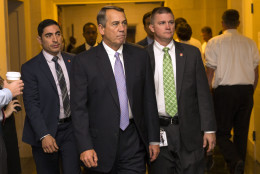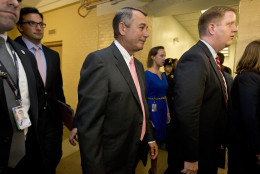sequestration
Would you rather be attacked and eaten by a great white shark, a saltwater crocodile or a hungry tiger? It's your call. The you-must-choose game is one my kids played with me when they were younger, and now federal workers get to play — or rather be pawns in — a version of that no-win game every couple of years when shutdowns are on the table.
October 20, 2015-
The service is implementing one of the few alternatives it has to a base realignment and closure (BRAC) round: moving soldiers and civilians out of its oldest buildings and shuttering them.
October 19, 2015 -
When Congress comes back next week, it begins a run of five consecutive weeks of work. In congressional time, that's a long stretch of uninterrupted work. A lot can happen if the outgoing Speaker of the House doesn't wait around like I did.
October 12, 2015 -
Congressional leaders are calling for bipartisan efforts to raise spending caps, to keep Defense funded and also provide government services that so many Americans rely on for education, health and employment.
October 08, 2015 -
Defense Secretary Ashton Carter said Wednesday that he has advised President Barack Obama to veto the Defense Authorization bill Congress will vote on later this week for several reasons.
October 01, 2015 -
Congress passed a 10-week temporary funding bill on Wednesday to keep open the government. The House voted 277-151 on the measure. It now heads to the White House for the president's signature.
September 30, 2015 -
The Defense Authorization Act will expand milestone decision authority for military service chiefs, it just has to get past President Obama first.
September 30, 2015 -
A stopgap measure to avert a federal shutdown is set for a vote hours before a fiscal deadline would force the government to start the new year with closed doors.
September 29, 2015 -
The Senate has voted in support of a bill that would keep the government open until Dec. 11. The continuing resolution would hold funding at 2015 levels and includes money for Planned Parenthood.
September 28, 2015 -
In-Depth host Francis Rose argues that Speaker Boehner's decision was both a bone toss and a punch in the mouth.
September 25, 2015 -
Deputy Secretary of Defense Robert Work says the Pentagon is making plans in case Congress cannot reach a budget deal or continuing resolution before Sept. 30.
September 25, 2015 -
Jeri Buchholz, former NASA CHCO and now strategic business development adviser for FMP Consulting, advises federal managers to begin preparing for a government shutdown by communicating more openly and often with their workforce.
September 24, 2015 -
Preparations for a government shutdown are underway, so if Congress does wind up making a deal and keeps the government open, agencies have spent a lot of time and money for no reason. Chris Cummiskey was deputy under secretary for management and acting deputy under secretary for management at the Homeland Security Department. He's now CEO at Cummiskey Strategic Solutions. He tells In Depth with Francis Rose about the real costs of a government shutdown.
September 22, 2015 -
Sources from the House Oversight and Government Reform and the House Appropriations committees said Monday that a vote on a "clean" continuing resolution has not yet been scheduled for next week.
September 22, 2015 -
AFGE reminds Congress, White House and others of the concerns feds had during the last government shutdown and the impact the work stoppage had on them and their families in 2013.
September 18, 2015








